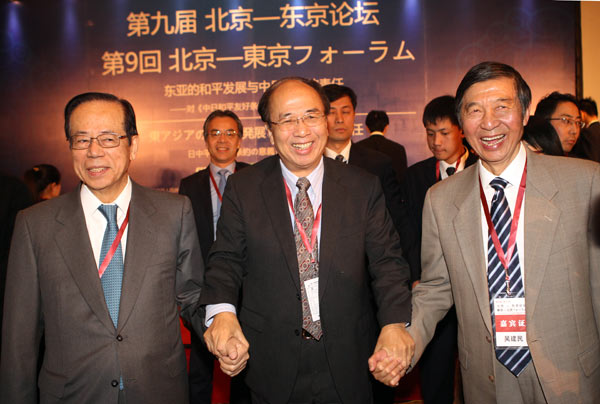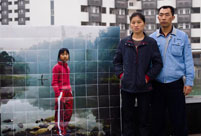 |
| From left: Former Japanese prime minister Yasuo Fukuda, Zhao Qizheng, former chairman of the Foreign Affairs Committee and former minister of the State Council Information Office, and Wu Jianmin, vice-chairman of the China Institute for Innovation and Development Strategy and former Chinese ambassador to France, join hands after the Beijing-Tokyo Forum on Sunday in Beijing. Zou Hong / China Daily |
Priorities are timely dialogue and a crisis management mechanism
A stable China-Japan relationship is in the interests of the two countries, Asia and the world, participants in the Beijing-Tokyo Forum agreed on Sunday.
The countries should be committed to peaceful means of settling disputes and problems, they said.
Officials, diplomats and scholars from the two countries put their heads together in Beijing over the weekend, trying to find solutions to the deadlock in China-Japan relations.
They agreed that shared interests should be maintained, unstable relations improved, and the deteriorating situation and confrontational feelings Chinese and Japanese harbor toward each other should be brought under control.
In the context of the territorial standoff, the top priority is to conduct timely dialogue and negotiations, achieve a settlement through peaceful means and establish a crisis management mechanism and a long-term mechanism that help avoid accidental friction and even military conflicts.
Former Japanese prime minister Yasuo Fukuda said building a strategically beneficial relationship between China and Japan is of great significance. "The two countries should find a solution to the problems in their ties."
Japan should deal with its history appropriately when forming its diplomacy, Fukuda said. In doing so, Japan can survive in the international community. Otherwise, it will be isolated.
Zhao Qizheng, former chairman of the Foreign Affairs Committee and former minister of the State Council Information Office, took the Beijing consensus as the appeal of the majorities.
"The consensus should become a force driving in the relationship to create better conditions," Zhao said. "I hope that it will turn into concerted action."
Though more than 70 percent of Chinese and Japanese wished to see a better relationship, more than 90 percent have negative feelings toward each other, according to the opinion poll in August by China Daily and Japan's non-profit organization The Genron NPO.
China Daily and The Genron NPO began the annual Beijing-Tokyo Forum in 2005, when China-Japan relations were strained by then-Japanese prime minister Junichiro Koizumi's frequent visits to the controversial Yasukuni Shrine.
Japan's current prime minister, Shinzo Abe, said in an interview with The Wall Street Journal that Japan was ready to be more assertive because "there are concerns that China is attempting to change the status quo by force, rather than by rule of law".
Abe made similar remarks on Sunday when addressing the Japanese ground self-defense force. He said it is necessary to give up the idea that "a deterrence will be achieved as long as the defense force is ensured", Japan's Kyodo News Agency reported.
He underscored the importance of discussing the legislative basis for Japan to exercise collective self-defense, which is forbidden in Japan's pacifist constitution.
 Low wages Indian migrant laborers
Low wages Indian migrant laborers Five fighters in flight training
Five fighters in flight training London mayor hails free trade, subway system on China tour
London mayor hails free trade, subway system on China tour Different eye catching shows at housing fairs in China
Different eye catching shows at housing fairs in China Special family portraits call attention to left-behind children
Special family portraits call attention to left-behind children Migrant children’s pain and joy in city
Migrant children’s pain and joy in city Lingerie show dazzles Wuhan Motor Show 2013
Lingerie show dazzles Wuhan Motor Show 2013  Running in fun customs at Beijing Int'l Marathon
Running in fun customs at Beijing Int'l Marathon  Weekly Sports Photos
Weekly Sports Photos Chinese riot police take Liberia peacekeeping mission
Chinese riot police take Liberia peacekeeping mission World has never been dark-- a blind kid’s life in Tibet
World has never been dark-- a blind kid’s life in Tibet Oriental education or western education?
Oriental education or western education? China in autumn: Kingdom of red and golden
China in autumn: Kingdom of red and golden U.S. Senate leader announces bipartisan deal
U.S. Senate leader announces bipartisan deal Chinese screen goddesses from Beijing Film Academy
Chinese screen goddesses from Beijing Film Academy Day|Week|Month